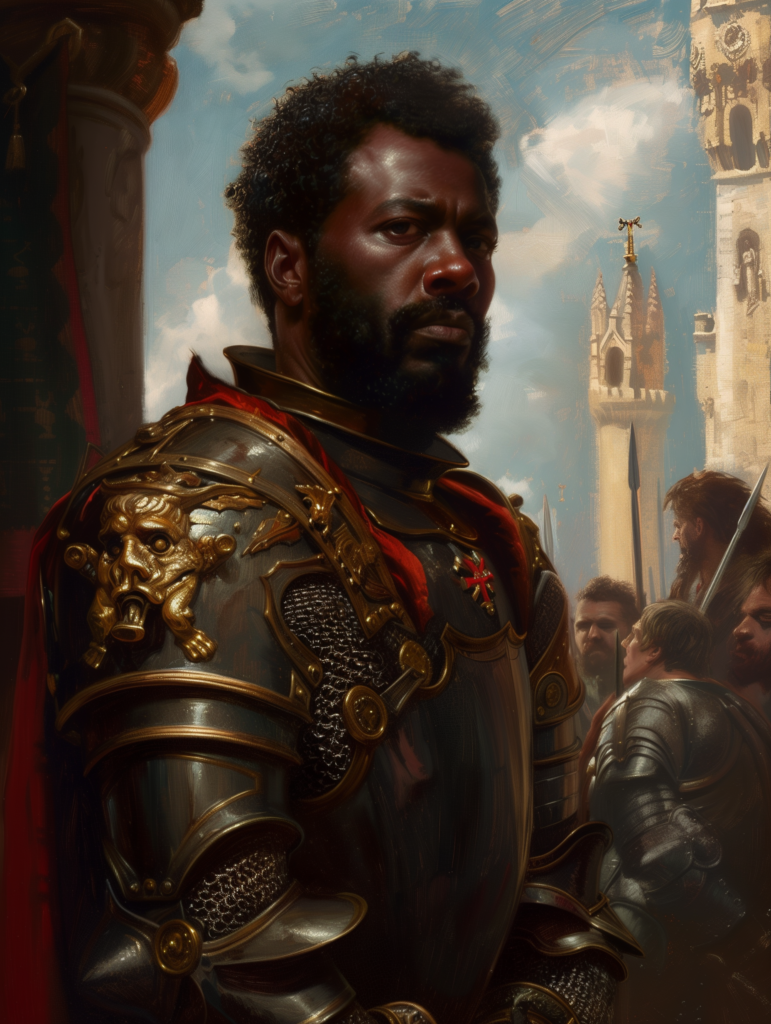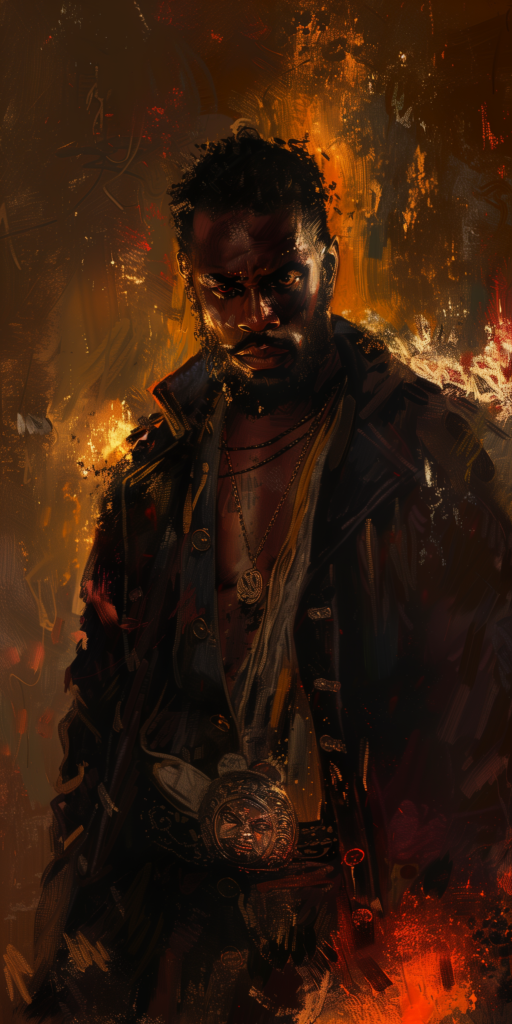Othello
“Betrayal, Jealousy, and Tragedy: Meet the Moorish General Othello in Shakespeare’s Classic Tale.”

- Alias: The Moor of Venice
- Gender: Male
- Race: Moor (North African descent)
- Occupation: General in the Venetian army
- Religion: Likely Christian, as indicated by the setting of the play in Venice
- Allies: Members of the Venetian senate, soldiers under his command
- Enemies: Those who oppose Venice or seek to undermine his authority, particularly Iago
- Abode/Base of Operations: Initially Venice, later Cyprus during military campaigns
- Nationality: Venetian
- Languages: Fluent in Venetian Italian, possibly other languages spoken in the Mediterranean region
- Alignment: Initially lawful and good, but shifts towards chaotic and evil as he succumbs to jealousy and rage
- Affiliation(s): Venetian military, loyal to the Duke of Venice and the Venetian state
- Significant Others: Desdemona, his wife
Othello, the tragic protagonist of Shakespeare’s play, is a Moorish general in the Venetian army. His story is one of love, jealousy, and betrayal, ultimately culminating in his downfall.
Life Story: Othello was born and raised in North Africa, later moving to the city of Venice. Despite facing prejudice and discrimination due to his race, he rose through the ranks of the Venetian army through his exceptional skill and leadership on the battlefield. His military prowess earned him the respect and admiration of his peers, including the Duke of Venice.
Othello’s life takes a dramatic turn when he falls in love with Desdemona, the daughter of a Venetian senator named Brabantio. Despite Brabantio’s initial objections to their union, Othello and Desdemona marry in secret and relocate to Cyprus, where Othello has been appointed to command the Venetian forces in a military campaign against the Turks.
However, their happiness is short-lived as Othello’s ensign, Iago, harbors a deep-seated jealousy towards him. Iago manipulates Othello into believing that Desdemona has been unfaithful to him, planting seeds of doubt and suspicion in his mind. Consumed by jealousy and rage, Othello becomes increasingly paranoid and irrational, ultimately leading to a tragic series of events that culminate in the deaths of Desdemona, Emilia, and Othello himself.
Achievements: Othello’s greatest achievement lies in his military success and leadership in the Venetian army. He is highly respected by his peers and superiors for his courage, intelligence, and strategic acumen on the battlefield. His rise from humble origins to the rank of general is a testament to his skill and determination.
Depth and Character Description: Othello is a complex character whose tragic flaw is his susceptibility to manipulation and jealousy. Despite his strength and bravery as a warrior, he is ultimately undone by his own insecurities and doubts. He is deeply in love with Desdemona and values honor and loyalty above all else. However, his inability to trust those closest to him and his tendency to believe the worst about himself and others ultimately lead to his downfall.
Fears and Motivations: His greatest fear is the loss of honor and reputation. As a man of noble birth who has risen to a position of authority in a society that views him as an outsider, he is acutely aware of the precariousness of his position. He fears being seen as weak or vulnerable and is motivated by a desire to prove himself worthy of the respect and admiration of his peers. However, this fear ultimately drives him to commit acts of violence and betrayal that are antithetical to his own values and principles.
Desires and Goals: Othello’s primary desire is to be loved and respected by those around him, particularly Desdemona. He longs for a sense of belonging and acceptance in a society that often views him with suspicion and distrust. His goal is to build a life with Desdemona based on mutual trust and devotion, but his inability to overcome his own insecurities and suspicions ultimately leads to tragedy.
Othello, the Moor of Venice

Medium humanoid (human), lawful neutral
Armor Class 17 (chain mail) Hit Points 126 (21d8 + 42) Speed 30 ft.
| STR | DEX | CON | INT | WIS | CHA |
|---|---|---|---|---|---|
| 16 (+3) | 14 (+2) | 14 (+2) | 12 (+1) | 10 (+0) | 16 (+3) |
Saving Throws Str +7, Con +6 Skills Insight +4, Persuasion +7 Damage Resistances psychic (due to strong will) Senses passive Perception 10 Languages Common, Moorish Challenge 8 (3,900 XP)
Actions
Longsword. Melee Weapon Attack: +7 to hit, reach 5 ft., one target. Hit: 8 (1d8 + 4) slashing damage.
Leadership (3/Day). Othello can inspire his allies with his charismatic leadership. As a bonus action, he chooses up to three friendly creatures within 30 feet of him. Each target gains advantage on saving throws against being frightened and gains temporary hit points equal to Othello’s Charisma modifier (minimum of 1) plus his level.
Commanding Presence. Othello can use his action to bolster the resolve of one friendly creature he can see within 30 feet of him. The target gains advantage on its next attack roll or ability check it makes before the end of its next turn.
Vengeful Strike (Recharge 5-6). When Othello takes damage from a creature within 5 feet of him, he can use his reaction to make a melee weapon attack against that creature.
Tactical Maneuver. Othello can use a bonus action to grant advantage on the next attack roll made by one friendly creature he can see within 30 feet of him.
Reactions
Parry. Othello adds 2 to his AC against one melee attack that would hit him. To do so, Othello must see the attacker and be wielding a melee weapon.
Indomitable Will. When Othello fails a saving throw against being charmed or frightened, he can choose to succeed instead.
Equipment
- Chain mail
- Longsword
- Shield
- Symbol of his rank as a general
Description: Othello stands tall and imposing, with a commanding presence that demands respect from allies and enemies alike. His dark skin hints at his Moorish heritage, and his piercing eyes betray a depth of wisdom and experience. Clad in well-maintained chain mail and wielding a longsword with skill and precision, Othello exudes an aura of authority and leadership. Despite his formidable appearance, there is a hint of sadness in his eyes, reflecting the inner turmoil caused by the treachery and deceit that surrounds him.

 Buy me a coffee
Buy me a coffee